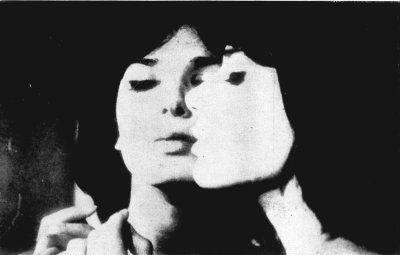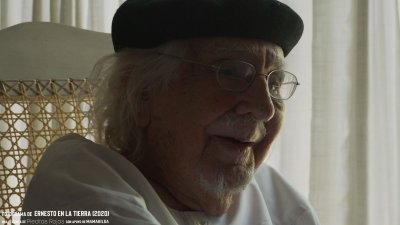I film di questa sezione sono:
NERUDA FUGITIVO
di Manuel Basoalto
Cile - 2015 - 90 min.
(lingua: spagnolo / sottotitoli: italiano)
ZURITA Y LOS ASISTENTES
di Jael Valdivia
Cile - 2021 - 60 min.
(lingua: spagnolo / sottotitoli: italiano, inglese)
VIOLETA EXISTE
di Rodrigo Avilés Pérez
Cile - 2022 - 75 min.
(lingua: spagnolo / sottotitoli: italiano, inglese)
ERNESTO EN LA TIERRA
di Manuel Alejandro Bonilla
Costa Rica / Nicaragua - 2021 - 74 min.
(lingua: spagnolo / sottotitoli: italiano)
EL LUGAR SIN LIMITES
di Arturo Ripstein
Messico - 1977 - 111 min.
(lingua: spagnolo / sottotitoli: italiano)
Omaggio a Manuel Antin
LOS VENERABLES TODOS
di Manuel Antín
Argentina - 1962 - 85 min.
(lingua: spagnolo)
INTIMIDAD DE LOS PARQUES
di Manuel Antín
Argentina - 1965 - 65 min.
(lingua: spagnolo)
CASTIGO AL TRAIDOR
di Manuel Antín
Argentina - 1966 - 70 min.
(lingua: spagnolo)
DON SEGUNDO SOMBRA
di Manuel Antín
Argentina - 1969 - 105 min.
(lingua: spagnolo)
ALLA LEJOS Y HACE TIEMPO
di Manuel Antín
Argentina - 1978 - 128 min.
(lingua: spagnolo)

ABOUT MANUEL ANTIN
Manuel Antín, director of eleven feature films between 1962 and 1982. Manuel Antín, director of the Instituto Nacional de Cinematografía de la República Argentina (National Institute of Cinema and Audiovisual Arts) between 1983 and 1989. Manuel Antín, founder and rector of the Universidad del Cine (University of Cinema), in Buenos Aires, since 1991.
Filmmaking, cultural management and academic work.
Three aspects that lead us to pay attention to the center of Cartas Iluminadas, Cinthia Rajschmir’s documentary concerning the intimate and dynamic relationship between cinema and literature supported by Antin (the director) and Cortázar (the writer).
Filmmaking: The Cinema of Manuel Antín
We can undoubtedly speak of Manuel Antin's cinema, characterized by a clearly authorial mark. Not because of a specific theme but because, since he was part of the '60s Generation of Argentine cinema, he developed a cutting-edge audiovisual narrative that wants to stage deeply human stories the camera pushes us away from so that we can come close again.
The relationship with literature is present in several of his movies, especially in those based on Julio Cortázar's stories. Nevertheless, we can also find it in the work inspired by Augusto Roa Bastos' literature, such as Castigo al Traidor, 1966.
It's a fruitful relationship since his movies go beyond the illustration of a literary text, follow the written story and present it with the neatness of an established and clear audiovisual language for the viewer.
In To say almost the same thing, Umberto Eco intends to establish a connection between source text and target text (the translation). In other words, to establish a negotiation whose result is not fidelity to the literary work, but instead a creation that somehow reflects the spirit of the source text.
We can as well consider Manuel Antin's movies a negotiation and an adventure, telling a story that is the object for the crystallization of a cinematographic version which explores its own means. A new “how” of the text emerges and is now told by the framing, the photogenic (the shots of accuracy and beauty are innumerable and unforgettable) or the montage, that gives us a disarticulated and real vision of time (The Odd Number). It shows something that is new, but still already latent in the literary work.
Unlike the majority of his previous movies, his latest ones (Juan Manuel de Rosas, Don Segundo Sombra, Allá lejos y hace tiempo) are in color. They explore themes connected to Argentine history and tradition. This is pretty much a more conventional register. However, what Manuel Antín proposes (just like his dear friend Leopoldo Torre Nilsson) is to insert into a theme and into an established model of representation the quality of a language that modifies it and that leaves traces of an authorial enunciation because the average spectator finds it attractive. Undoubtedly, resonance can be found in the alternation of Borges' stories, between the absoluteness of El Aleph and the gaucho tradition of La intrusa.
Cultural management: Argentine Cinema during democracy
With the restoration of democracy in Argentina in 1983, a new stage in the country's cultural life began. The national cinema had its industrial heyday in the 40s and 50s, then in the 60s gave rise to a thriving avant-garde in the aforementioned Generation of the '60s and in the political cinema that developed simultaneously. Heir to a long tradition, it was facing a new challenge.
At the beginning of the new political stage in Argentina, cinema was finally able to express styles, themes, people, and characters that previously could not reach the screens.
Manuel Antín took on a challenge and worked in the Argentinean government's agency for the promotion of audiovisual production with the full support of the new President of the Nation, Dr. Raúl Alfonsín. The goal was to leave a mark in history. Its public management allowed filmmakers of the most diverse aesthetic and ideological positions to have access to credits and subsidies to make their movies. From La historia Oficial (Luis Puenzo, 1985), the first Argentine film to win an Oscar, to the transgressive cinema of Jorge Polaco (Diapasón, 1986), and to the incorporation of young technicians and directors: all these were facts that marked a broad and plural audiovisual development of the country.
This support and growth of national production was wisely connected with the intense attempt of exporting Argentine cinema abroad, the participation in festivals and the creation of Argencine, an entity aimed at distributing films abroad so that low-budget films could be present in the markets.
The result of his administration was a new Argentine cinema (in democracy) with a new place in the world.
Academic work: The University of Cinema
After managing Instituto Nacional de Cinematografía, his passion for filmmaking is still alive. How to train young people to tell new stories? He found the answer in the university environment. Why the university? In the academic tradition, the university represented the space of diversity, of discussion, of freedom of thought, of the encounter of diverse knowledge. According to Manuel Antín's point of view, being an expert in microphone technique, in the exact execution of a set, in the repetition of narrative formulas or in determining with precision the diaphragm for a shot is not enough. He comprehends that all these fundamental operations of cinema are based on a global understanding of the art of filmmaking. Editors and designers of a film can't be unaware of the importance of art, history, philosophy, semiology, and literature.
The Universidad del Cine is conceived as a place where passionate about filmography gather in corridors, courtyards, and classrooms to carry out their projects.
That is why one of the fundamental premises of its creation is to film, film, and film.
More than one hundred short movies a year, five feature films produced by the University and dozens of feature films created by students with institutional support: all of this is a manifestation of the will and work of Manuel Antín as founder and rector of the Universidad del Cine.
An achievement in which this impulse materializes is the formation of a generation of filmmakers such as Damián Szifrón, Pablo Trapero, Ana Katz, Ariel Winograd, Juan Taratuto, Paula Hernández, Juan Villegas, Andy Muschietti, Celina Murga, Albertina Carri, Alejandro Fadel, Santiago Mitre, Lisandro Alonso, Rodrigo Moreno, Ulises Rosell, Mariano Llinás, Matías Piñeiro, Alejo Moguillansky, Hernán Musaluppi, among many others.
To sum up, there is no doubt that Manuel Antín has been three times the founder of a new Argentine cinema: in his work, in the promotion of audiovisual production at a national level and, in the third instance, in the training of new filmmakers, since the audiovisual creation of the future belong to them.
It is impossible not to close this portrait with a piece taken from a conversation between Antín and Cortázar, at the end of the screening of The Odd Number, when Antín tells the author: “I would like to be a writer like you” and when Cortázar replies “I would like to be a film director like you”.
Luis Facelli













